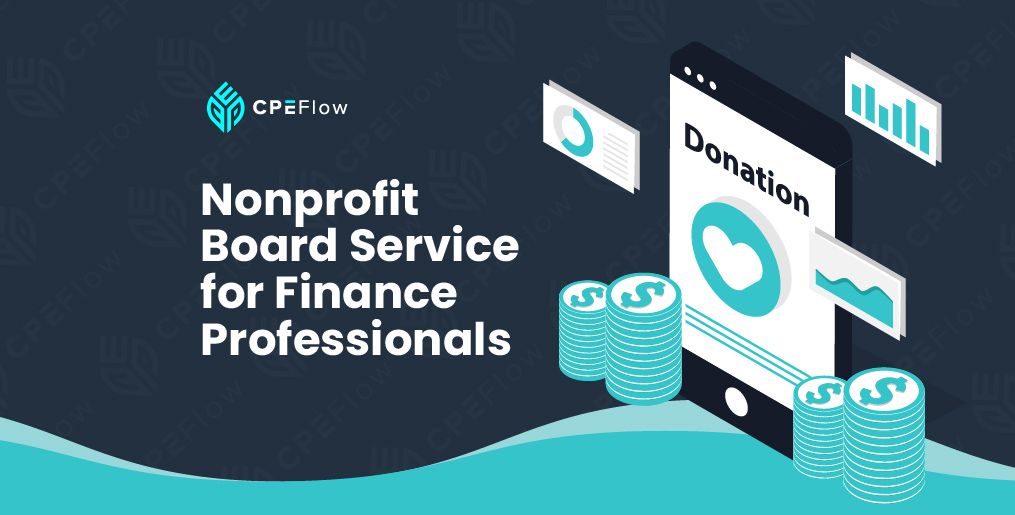Nonprofit Board Service for Finance Professionals
Jun 30
/
Nathan Liao, CMA

As a financial professional, serving on a nonprofit board is an excellent way to make a meaningful impact while strengthening your skills and connection networks.
Finance professionals play essential roles in these organizations due to the unique skills they bring to the table. Their expertise enables nonprofits to navigate money-related challenges, manage resources, and stay compliant.
In this blog, we'll explore some of the responsibilities and duties finance professionals can take on as nonprofit board members and break down the fundamentals of nonprofit financial management.
If you wish to grow as a leader, apply your skills and knowledge in a different setting, and give back to your community, check out CPE Flow's course on nonprofit board service and financial governance.
What Benefits Can Finance Professionals Bring to a Nonprofit Board?
As a financial professional, your experience and knowledge can help a nonprofit board in many ways.
Here are a few key ways finance professionals can contribute to a nonprofit board:
- Financial Oversight: Your expertise as a finance professional can help a nonprofit with budgeting, forecasting, and financial reporting. This helps improve cash flow and decision-making.
- Strategic Thinking: You can help align the nonprofit’s financial approach with its long-term goals. For instance, you can provide advice on how to fund new programs, manage risks, make better use of resources, or cut down on unnecessary spending.
- Policy Development: Many nonprofits have financial policies to cover areas like budgeting, debt management, fund disbursement, and internal controls. You can help draft, review, or refine these policies to reduce risk and promote accountability in the board.
- Audit and Compliance Expertise: Understanding audits and regulatory requirements is critical. Your expertise can be used to support the audit committee and ensure the nonprofit remains in good standing with funders and regulators.
- Credibility: A board with strong financial oversight will allow the organization to build trust and confidence among donors and partners. This also reinforces the organization's reliability and accountability.
As a finance expert, your skillset can help nonprofits make better-informed decisions and stay financially healthy, which is essential for long-term sustainability.
Benefits of Joining a Nonprofit Board
Serving on a nonprofit board can give you a lot of satisfaction and fulfillment. But you can also expect many other benefits apart from this.
Here are some possible advantages of nonprofit board service for finance professionals.
- Improved leadership and communication skills: Board service will often involve a lot of discussion, collaboration, and policy development. These are valuable opportunities for you to refine your leadership, communication, and problem-solving skills in a new context.
- Expanded professional network: Joining a nonprofit board gives you the chance to meet and connect with people from different industries, like business leaders and other professionals. These connections can lead to new partnerships and career opportunities.
- New perspectives and experience: Working with a nonprofit exposes you to challenges you might not face in a for-profit setting. Your versatility and problem-solving skills will naturally expand as you adapt to these differences.
- Personal fulfillment: Being a board member allows you to contribute to the community. Your financial expertise and knowledge can help nonprofits make better decisions and allocate resources wisely, allowing them to make a bigger and more sustainable impact. Many finance professionals find that carrying out this role gives them a strong sense of fulfillment.
Get Exclusive Access & Special Discounts!
Get early bird access to new CPE courses and exclusive discounts only shared with our email subscribers.
What is Nonprofit Financial Management?
Nonprofit financial management is the process of planning, monitoring, and controlling an organization's financial resources to effectively support its goals and mission.
It goes beyond basic bookkeeping and includes budgeting, forecasting, financial reporting, managing risks, and complying with tax laws and local regulations.
Strong financial management builds trust with stakeholders and the communities served. It also equips leaders with the information they need to make strategic decisions that help grow the nonprofit's impact and reach.
Nonprofit Financial Policies
Financial policies play a foundational role in effective nonprofit financial management. They guide how the organization handles everything from spending and reimbursements to conflicts of interest.
You can think of it this way: Financial management is the engine that keeps the organization moving in the right direction. Meanwhile, financial policies are the manual that ensures that the engine runs smoothly.
Some key areas nonprofit financial policies should address include:
- Budgeting: These guidelines are for creating, approving, and monitoring the nonprofit's budget. They help ensure that all planned activities are within the organization's budget and will not jeopardize its long-term sustainability.
- Expense reimbursement: A nonprofit requires clear rules on which expenses can be reimbursed and what information staff or volunteers must submit to claim reimbursement.
- Conflict of interest: These policies are meant to disclose and manage potential conflicts among the board or staff if they have conflicting interests that might go against what's best for the nonprofit organization.
- Delegation of authority: Policies should clearly define approval thresholds, designate roles, and establish procedures for handling conflicts of interest and insider transactions. This ensures accountability and prevents misuse of funds.
- Financial reporting: An organization should have clear timelines and responsibilities for preparing and reviewing financial statements.
- Staff compensation: It's important for nonprofits to have policies for setting and reviewing staff salaries and benefits, ensuring they are fair, reasonable, and aligned with the organization's budget and mission.
Having these policies in place not only reduces the risk of financial mismanagement but also increases confidence in donors and stakeholders.
Nonprofit Financial Statements
Not-for-profit financial statements look different from those of for-profit companies. However, they serve a similar purpose, which is to provide a clear picture of the organization's financial health. They are essential for transparency, planning, and decision-making.
Key nonprofit financial statements are as follows:
Statement of Financial Position
This is the nonprofit equivalent of a balance sheet. It consists of three main components, which are:
- Assets: What is possessed or controlled by the organization, such as cash or property
- Liabilities: What the organization owes to other parties, including debts or deferred payments
- Net assets: The residual amount when subtracting the liabilities from the assets
This nonprofit financial report helps stakeholders understand the nonprofit's overall financial position and ability to meet its obligations.
Statement of Activities
This statement is similar to an income statement for for-profit companies. It outlines the organization's revenue and expenses over a specific period and shows how net assets have changed.
This illustrates how the nonprofit manages and uses its resources to support its goals and mission.
Statement of Functional Expenses
This statement breaks down expenses by their nature and function, showing exactly how resources are allocated, whether to salaries, rent, specific programs, or fundraising efforts.
It helps illustrate how different expenses support the organization's mission and operations.
Statement of Cash Flows
This statement shows how cash moves in and out of the organization during a given period. It's divided into operating, investing, and financing activities.
This statement allows the nonprofit to assess its liquidity and ability to fund programs and operations.
Nonprofit Audits and Examinations
Nonprofit accounting and audits help organizations maintain accountability and transparency. This process involves examining the organization's statements, records, and transactions to assess its financial health and ensure compliance with applicable laws and regulations.
There are several types of audits a nonprofit might undergo. For instance, an independent financial audit involves a neutral third party, who will review the organization's records and provide an objective assessment of its financial standing and compliance.
Audits can also be done internally. In this case, the finance or management team reviews financial transactions to evaluate whether the organization is meeting its goals and identify areas for improvement.
The Value of Nonprofit Board Service for Finance Professionals
Serving on a nonprofit board can be a valuable and rewarding experience for finance professionals. It gives you plenty of opportunities to apply your financial skills in a setting focused on mission-driven work rather than solely on profit.
It's also a chance to grow as a leader, strengthen your communication and decision-making skills, and contribute to causes that matter. By lending your expertise, you can help nonprofits operate more effectively and make a lasting difference in your community.
If you're keen on exploring nonprofit board service as a finance professional, check out CPE Flow's course on nonprofit board service. You'll gain access to comprehensive and expert-crafted materials on nonprofit financial management, board duties, financial policies, audits, and more. The good news is that you can do the entire course at your own pace and from home, all while earning NASBA-approved CPE credits.
Thank you for reading,

Nathan Liao, CMA
Empty space, drag to resize
Nathan Liao, a Certified Management Accountant, educator, and influential business figure in the accounting industry, has dedicated over a decade to supporting more than 82,000 accounting and finance professionals in their pursuit of the CMA certification. As the visionary founder of CMA Exam Academy and CPE Flow, Nathan is committed to delivering premier online training solutions for the next generation of accounting and finance professionals.
Explore Our Self-Paced CPE Courses
CPE Flow
© 2022 - 2025 CPE Flow, LLC. All Rights Reserved.
Refund & Complaint Policies
Requests for refunds must be made in writing within 5 days of purchasing the course. No refunds or credits will be provided after this point or if the final assessment is completed. CPE Flow issues refunds within 30 days in the same format as the payment was received. The refund amount is based on the timeframe in which the request was submitted (see table).
| Request Timeframe |
Refund/Credit Amount |
|
≤ 2 Hours |
100% Refund* |
|
> 2 Hours ≤ 48 Hours |
90% Refund* or 100% Credit** |
|
> 48 Hours ≤ 5 Days |
0% Refund or 50% Credit** |
* If a credit card was used for purchase, the 3.5% credit card fee will be deducted from the refund amount.
**Credit can be applied towards the same offering at a later date or a different offering.
For complaints or concerns, please email support@cpeflow.com
